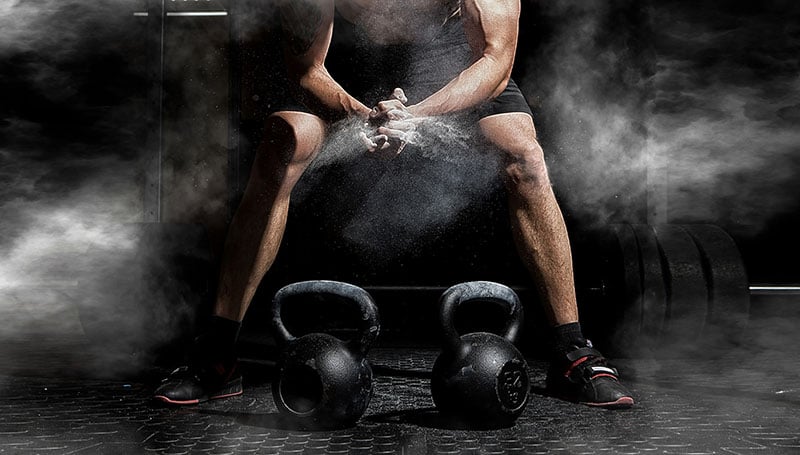
Kettlebells, while sometimes overlooked at the gym, are a brilliant and versatile piece of equipment. You can do a full-body workout with a few simple kettlebell exercises to build strength everywhere from your legs and core to shoulders and back. Plus, many of these will get the heart pumping and blood flowing. Next time you get to the gym, try these best kettlebell exercises for the ultimate workout.
RELATED: The Best Upper Body Workout For Max Muscle Growth
Kettlebell Exercises
1. Kettlebell Swing
Kettlebell swings are a great way to elevate your heart rate and strengthen your posterior chain. It’s a hip-hinging move that requires full engagement of the hamstrings and glutes to initiate the hip thrust to swing. If you’re new to kettlebell swings, start with lighter weights to get your form correct. However, once it is right, heavier loads are going to strengthen you faster, burn fat, and give you a great cardio workout.
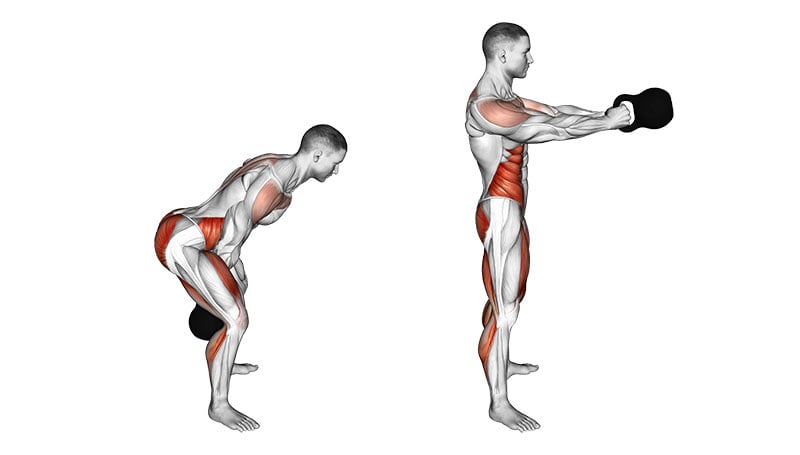
Steps
- Stand with your feet just wider than shoulder-width apart, with the kettlebell on the floor just behind you.
- Bend your knees to grab the kettlebell behind you. Make sure to tilt at the hips, pushing your butt backward. Keep your chest up and back straight.
- Drive forward with your hips in a thrusting motion, and as your knees straighten, use that momentum to swing the dumbbell up to shoulder height.
- Repeat in a continuous loop for a full set.
2. Kettlebell Goblet Squat
Give your glutes, hamstrings, and quads an excellent workout with goblet squats. This kettlebell exercise is a compound move that works multiple joints and multiple muscles at once, so it’s efficient and effective for fat burning and strengthening. Plus, goblet squats allow you to drop into your natural center of gravity, which is useful for anyone struggling with form.
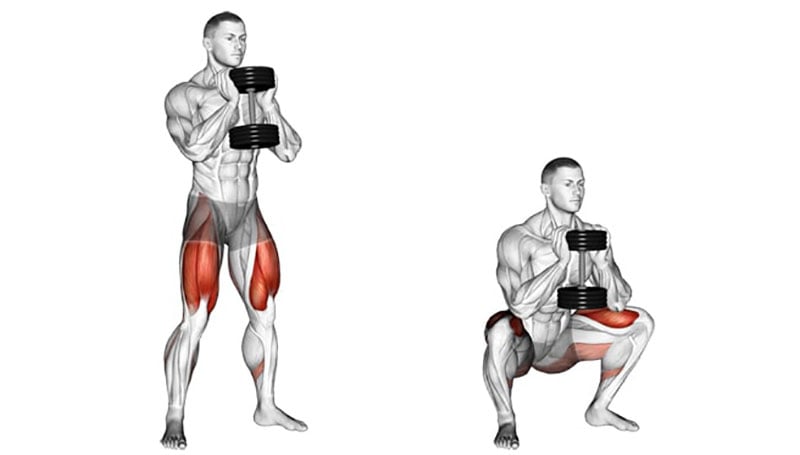
Steps
- Stand with your feet just wider than hip-width apart, and toes pointed slightly out. Additionally, keep your core engaged and head up.
- Hold the kettlebell at chest height, using both your hands with your palms facing in.
- Bring yourself down into a squat until your knees are fully bent. Make sure you bend at the hips, pushing your butt backward, and keeping the chest up. This posture, balanced with the weight, will allow you to find your natural center of gravity.
- Drive-up through the floor and return to a standing position.
- Focus on bringing the weight back up in a straight line. Tense your glutes and engage your core, moving your hips and chest as one unit. By doing so, you will make sure you’re back isn’t rounding, and you’re not swinging.
- Repeat for a full set.
3. Kettlebell Farmer’s Walk
Kettlebell farmer’s walks are a full-body workout. This kettlebell exercise will strengthen your grip and upper back, work the muscles in your legs, and engage the core. Carrying more weight as you walk, makes your leg muscles work harder. Additionally, by holding weights, then adding momentum, it forces your abdominals to compensate for the shift in weight. Then, your upper arm and back muscles engage to help carry the load and take the pressure off your forearms. Plus, it’s practice for bringing the groceries inside in one trip without breaking a sweat!
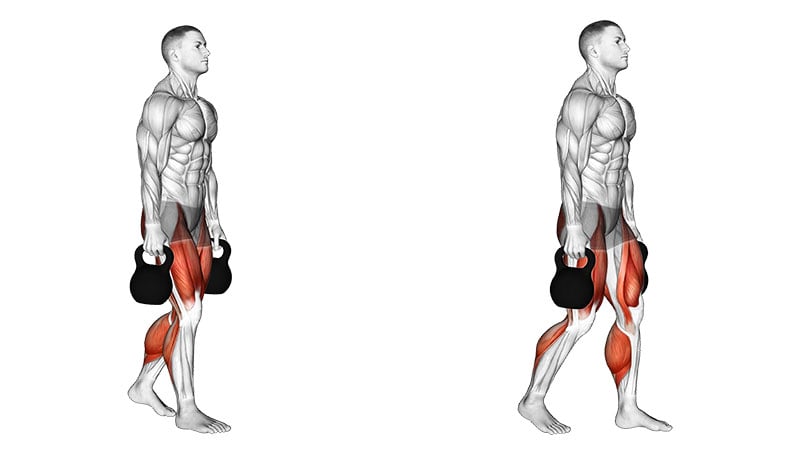
Steps
- Hold two kettlebells, one in each hand, arms by your sides.
- Then take a walk, with short, quick steps, focussing on keeping your body straight and core engaged.
- Keep walking, or doing laps, until you feel your grip weaken. You’ll want to put the weights back down before complete failure to avoid broken toes, tiles, or floorboards.
4. Kettlebell Two Arm Military Press
A military press targets both the deltoids in the shoulders, as well as the triceps. Plus, it works the legs and core as a byproduct of maintaining stability throughout the move. Performing a military press with kettlebells will improve the mobility in your upper body, and perfect your pressing form.
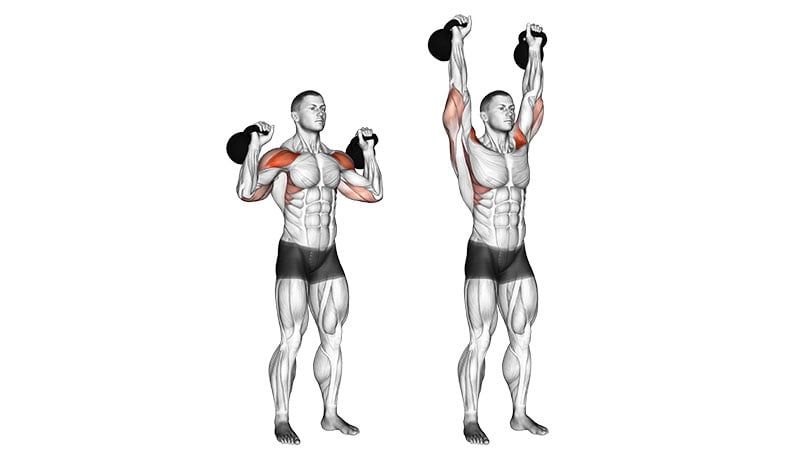
Steps
- Stand with your feet hip-width apart, and keep your core engaged and head up.
- Hold a kettlebell in each hand, palms facing forward, with the weight at the back of your hands.
- Pull the kettlebells up to shoulder height for the starting position. The weight should sit slightly behind your shoulders.
- Press the kettlebells up above your head until your arms are straight.
- Lower the weights back down to your shoulders, with control.
- Repeat for a full set.
5. Kettlebell One Arm Floor Press
While you get to lie down for this kettlebell exercise, it’s not a rest. These one-arm floor presses target the pecs, as well as the deltoids and triceps. Additionally, you’re going to be working your core as you engage these muscles to keep your back flat on the floor and initiate the momentum to push the kettlebell up.
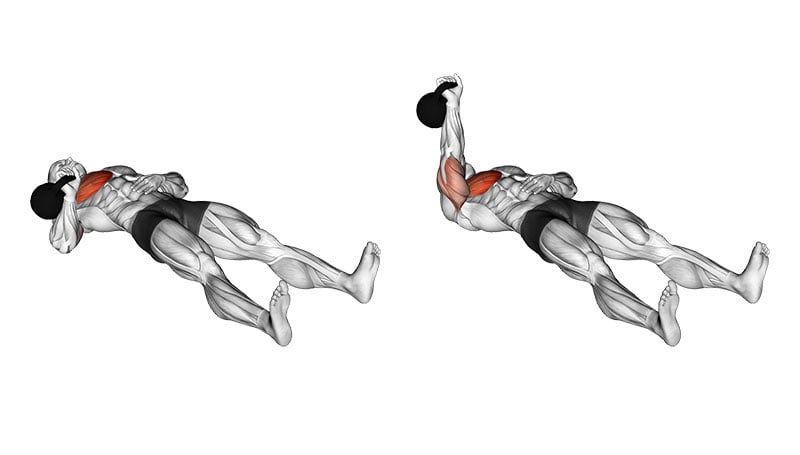
Steps
- Lie on your back on the floor, keeping your abdominals drawn in so your back doesn’t arch.
- Hold the kettlebell in one hand, keeping the weight behind your hand, with your palms facing toward your feet.
- Push the weight towards the ceiling until your arm is straight.
- Lower the kettlebell back to the starting position.
- Complete a full set on one arm before moving to the other.
6. Kettlebell Deadlift
Kettlebell deadlifts are another brilliant compound exercise that engages multiple muscle groups. You’ll feel the burn in your glutes, quads, and hamstrings, as well as your lats and traps. Deadlifts can be done with a barbell as well, but are great to do with kettlebells as an alternative.
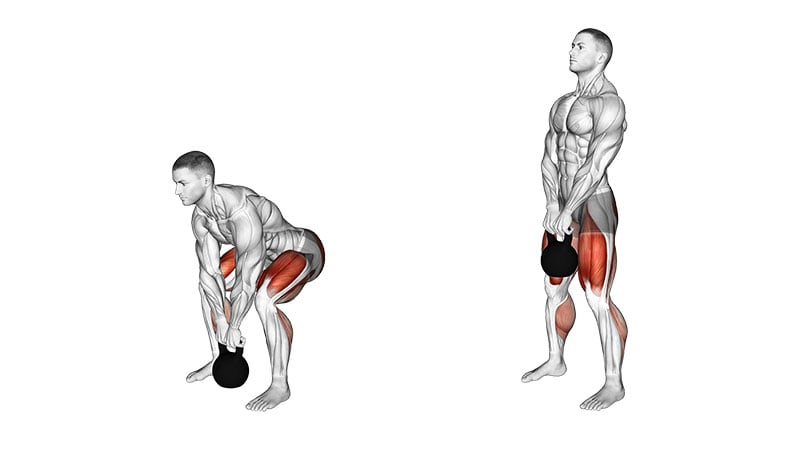
Steps
- Stand with your feet hip-width apart, and the kettlebell positioned between your feet.
- Squat down to grasp the kettlebell with both hands in an overhand grip. As you squat, keep your back straight and chin up.
- Drive-up through the floor out of your squat, pulling the kettlebell straight up, until your body upright. Your arms should be straight down, and the kettlebell sitting in front of your thighs.
- Lower the weight back down, with control, until you’re back in the squat position.
- Repeat for a full set.
7. Kettlebell Thruster
Take your kettlebell workout to the next level with some thrusters. This killer move is a full-body workout that is extremely effective and will get your heart pumping. Firstly, it targets your quads, calves, and glutes in your lower body. Then, in your upper body, it works the pecs, delts, biceps, and traps.
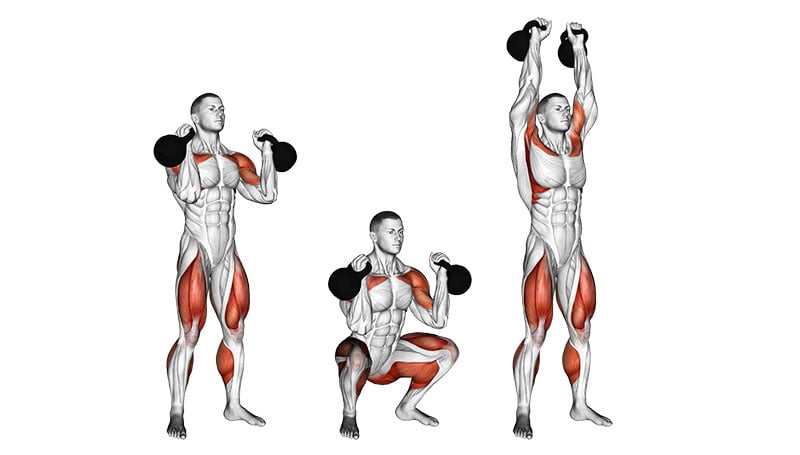
Steps
- Stand with your feet just wider than hip-width apart, back straight, and core engaged.
- Holding a kettlebell in each hand at chest height, drop into a squat until your knees are at 90-degrees. Make sure you bend at the hips, pushing your butt backward, but keeping the chest up.
- Driving up through the floor, return to a standing position. However, you’re going to keep the momentum going and push the kettlebells straight up into a shoulder press, fully extending your arms.
- As you bring the weights back down to chest height, drop back into another squat, continuing the loop for a full set.
8. Kettlebell Backward Lunge
Thick thighs save lives! Reach those leg goals with some kettlebell lunges. These are great for developing the quads and hamstrings, as well as the glutes. Additionally, weighted movements like this also challenge the core and abdominal muscles to maintain balance and posture.
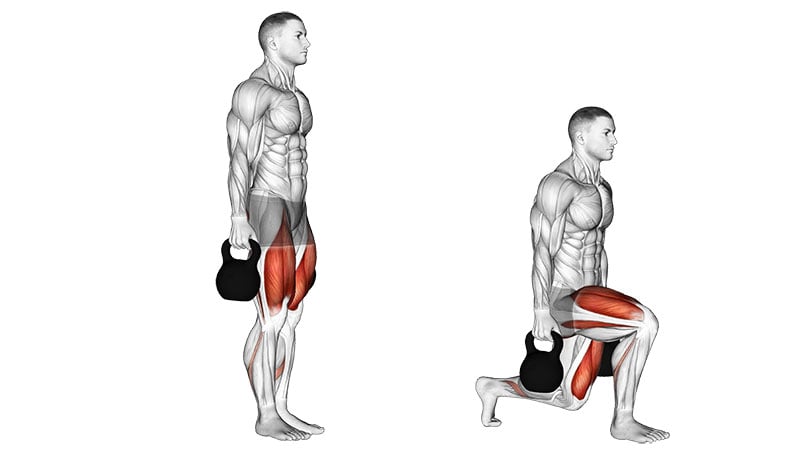
Steps
- Stand with your feet hip-width apart.
- Hold a kettlebell in each hand, down by your sides.
- Step one foot back and drop into a lunge position. You’ll want both legs to be bent 90-degrees at the knee.
- Bring that back foot back to the middle and your original starting position.
- Repeat the move by dropping the opposite foot back into a lunge, and back up. Then, complete the set alternating legs.
9. Kettlebell Pistol Squat
Pistol squats are a challenging move that will test even the toughest of gym-goers — adding the weight ups the ante even more. This kettlebell exercise tests your balance and engages your core. Additionally, it puts the burn on the glutes and quads, by only using one leg at a time. Finally, it also increases the mobility of the joints through your legs and ankles. While it’s a more advanced move, beginners can still tackle this by sitting back onto a chair or allowing your foot to touch the ground.
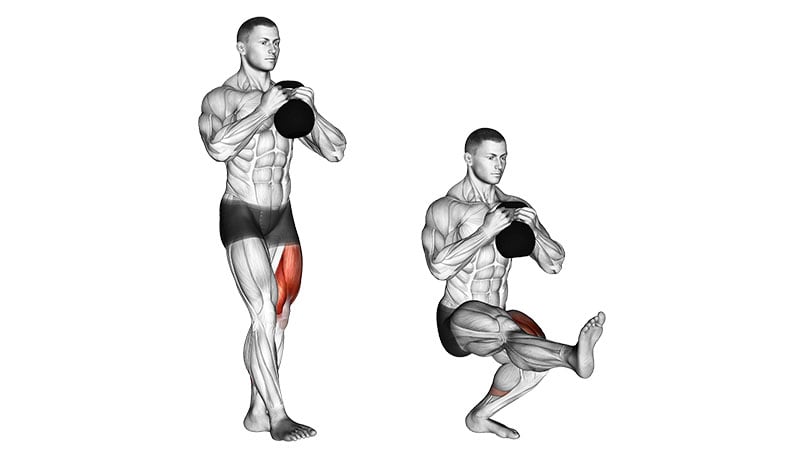
Steps
- Hold the kettlebell under your chin with both hands.
- Lift one leg, and hold it out in front of you as you drop into a squat on the other leg. Keep the raised leg as straight as you can, toes flexed, and foot off the floor.
- Driving up through the floor, return to a standing position. Again, try not to let the leg in front touch the ground to do this.
- Drop back down into another squat on the same leg, completing a set before switching legs.
10. Kettlebell One-Arm Row
Build strength in your back muscles, including the traps, lats, and other stabilizing muscles with a one-arm kettlebell row. This row uses a lunge position. As such, it’s more athletic and requires full body activation. One-arm exercises are also great for identifying if you have a weak side. If you do, this is a great way to bring it up to speed and even out your strength.
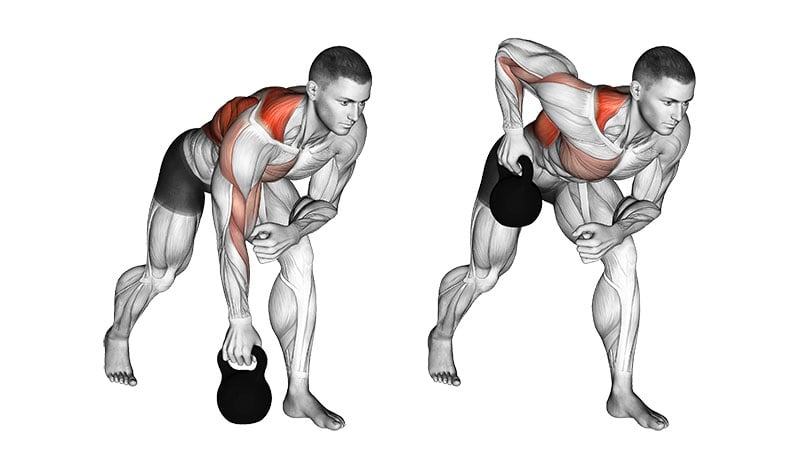
Steps
- Stand with one foot forward, and one foot back, toes pointed slightly out. The kettlebell should sit next to your front foot, on the inside.
- The arm on the back foot side will do the row. As such, place your other arm across your front thigh to brace your upper body. Keep your back straight and core engaged.
- Hold the kettlebell hand in your rowing hand, palm facing in.
- Pull the weight up towards your chest. Keep your elbow tucked close to your torso, but allow it to extend behind your body. Focus on not letting your torso twist.
- Release the weight back down with control.
- Complete the set on one side before switching arms.
11. Kettlebell Double Windmill
Get a lot of bang for your buck with double kettlebell windmills. This full-body exercise is going to hit your glutes, legs, shoulders, back, and abdominals all in one power move. Plus, it increases the flexibility in your hips and hamstrings and boosts your shoulder stability. It’s a kettlebell exercise that packs a punch.
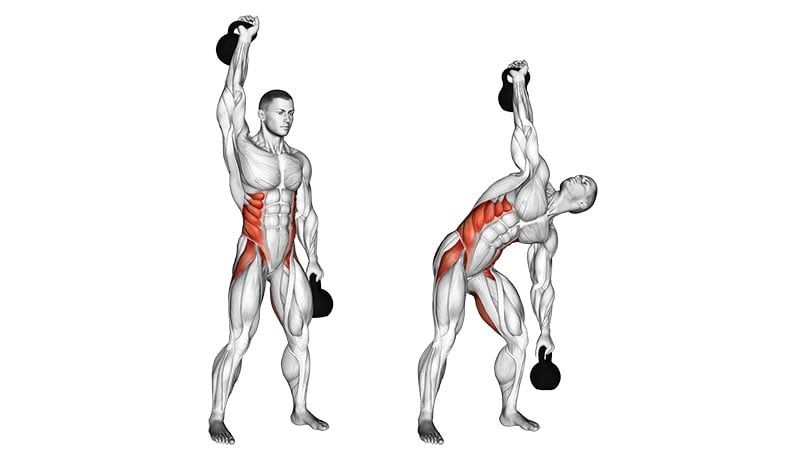
Steps
- Stand with a wide stance, back straight, core engaged.
- Raise one kettlebell above your head, with the weight sitting behind your hand. Hold the second kettlebell in the other hand, down by your side, palms facing in.
- You’re going to lower the kettlebell in your bottom hand to the ground. It should touch the floor at the inside of your foot on the same side. Bend at the hips, on an oblique angle, keeping your back straight, until the kettlebell touches the ground. Singing I’m a Little Teapot will help get the movement correct.
- Keep your other arm raised and straight up as you lower your torso down. This arm remains up the whole time.
- Pull your torso, and the kettlebell back up to the starting position.
- Complete the set on one side before switching arms.
12. Kettlebell One-Arm Clean and Jerk
A kettlebell one-arm clean and jerk is a power move to work nearly every muscle in your body. First, it uses the power from your legs to push you up from a squat. Secondly, the muscles through your shoulders and back pull the weight of the kettlebell up, then jerk it over your head. Thirdly, your entire core is engaged and working hard to make sure you don’t fall over and bruise your body or ego. Finally, because it involves such large muscle groups, it’s an incredible cardiovascular workout that’s sure to get the blood pumping.
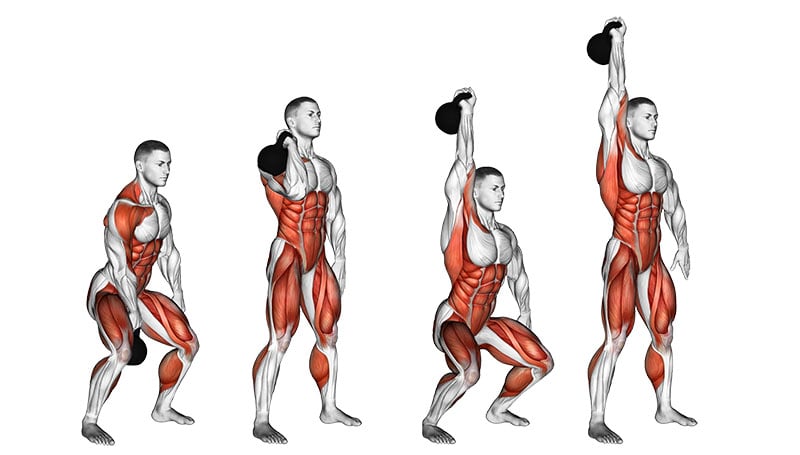
Steps
- Stand with your feet shoulder-width apart.
- Holding a kettlebell in one hand between your legs, drop into a squat until your knees are at 90-degrees.
- Driving up through the floor, use your momentum to bring the kettlebell up to shoulder height. ‘Catch’ the weight with a half squat, then push up again to a standing position.
- Drop into another squat, then again, drive up through the floor, and use your momentum to press the kettlebell up above your head until your arm is straight. ‘Catch’ the weight with a half squat, then push up again to a standing position.
- Bring the weight back down to your shoulder, then to between your legs.
- Complete the set on one side before switching arms.
The Benefits of Training with a Kettlebell
Working out is an important part of staying healthy, and while muscle training can take a while, there are effective ways to reach your goals faster. The kettlebell is a piece of equipment that offers increased mobility, enhanced toning, and definition and works well for people with varied skillsets. If you are introducing the workout into your routine or you need to enhance your overall training sessions, here are the reasons why you should introduce kettlebells into the mix.
Simplify Your Training
Kettlebells are one of the best training products simply because of their versatility. Because of their straightforward design, you can use them as part of your strength training, cardio, conditioning, and toning. With so many different sizes and weights to choose from, you can also change the levels of heaviness as you increase in strength. The beauty behind this gym equipment is its adaptability – you can use it for every aspect of your training. Whether you are working on your shoulders, abs, or simply increasing your range of motion, you can use it inc combination with your favorite workout for a holistic and full-body toning and endurance session.
Substitute Cardio
Cardio is hard, there’s no doubt about it. The beauty behind kettlebell workouts is they will typically engage a wide range of muscles in a single workout. This means you can effectively substitute cardio with one of these pieces of equipment. If you move your body with the kettlebell at a consistent rate – say for 20 minutes – you can easily feel the benefits that would be similar to a HIIT training session or running on a treadmill at a 6-minute mile pace. Of course, just like all exercise, you should stay consistent with the workout and try to fit in a training session three times a week for effective results.
Build Posterior Chain Strength
You can try many different moves using a kettlebell, and thanks to its versatility, you will reap the benefits from every action you try. One popular choice is a kettlebell swing. This can help improve and build posterior chain strength – the muscle that sits on the backside of your body. While you can work on this part of your body using dumbbells or barbells, the shape and size of kettlebells mean it will train the muscles differently. It may give you faster results and burn more calories in a single session.
Train You to Move Better
As mentioned earlier, this equipment is incredibly versatile and can help train the body no matter your skill level. With sizes and weights ranging from 4kgs to 60+, you can work your way up or down depending on the area you wish to train and build up. This means you can essentially build up muscles in places that may be harder with another piece of equipment, such as a dumbbell or barbell. It is also a great way to increase your range of motion in positions like squats – you can then work your way up the size and weight depending on your skillset. But before you gran the kettlebell, make sure you are standing in the correct position to avoid any injuries or strains.
Increase Your Range of Motion
Unlike traditional weights such as dumbbells and barbells, a kettlebell will need a wide range of movement for effective results. This means you will move your body differently, therefore increasing your range of motion. Why is this? You can swing, press, or carry this equipment, meaning you use dynamic movements to feel its full effect – whereas other equipment requires the same movement over and over.&
Fix Muscle Imbalances
Address weakness in parts of your body, enhance particular muscles and increase your overall body strength using kettlebells – they do it all! This equipment is usually used with a single arm or leg, meaning you can build the muscle tone effectively on both sides of the body rather than relying on the stronger side to get you through. When you squat and start to swing the kettlebell, you also improve your overall sense of balance and stability, which will help improve your form over time.
FAQs
What are the best kettlebell exercises?
With the right combination of exercises, you can enjoy a full-body workout with a set of kettlebells. The best moves to do this are a kettlebell swing, goblet walk, farmer’s walk, two-arm military press, one-arm floor press, deadlift, thruster, backward lunge, pistol squat, one-arm row, double windmill, and a one-arm clean and jerk.
Is 20 minutes of kettlebells enough?
Using the right intensity level, you can certainly achieve a decent workout using kettlebells in just 20 minutes. A combination of large compound moves with heavy weights and no breaks between exercises will get the blood pumping and heart beating. Try 10-15 reps each of swings, squats, deadlifts, rows, farmers walks and presses for three sets, and a 60-90-second break between sets.
Do kettlebell exercises really work?
Kettlebells are a useful piece of equipment for burning fat and building muscle. They’re versatile, adaptable, and work for a lot of people. You just have to adjust your grip slightly compared to using a dumbbell or barbell because of the shape. Of course, equipment choice comes down to personal preference, what works for you, and your fitness goals.
Is it OK to do kettlebells every day?
It can be ok to do kettlebells every day, depending on the exercises you’re performing, the intensity, and your fitness goals. High-intensity workouts should be limited to two or three times a week to allow your body time to recover. You can alternate this with other activities that work you differently. Low-intensity sessions can be done daily, but you need to remember to listen to your body and have a rest day if you need it.
Do I need 2 kettlebells?
You can enjoy a solid workout with just one kettlebell. As a newbie, it can be a good idea to start with only one, as this will let you get used to them and master basic moves. However, it can also be beneficial to invest in a set of two, as this balances the load and can make performing some exercises, such as farmer’s carries, easier. It can also cut time off your session as you can work both sides at once. Of course, you need to remember that two means twice the weight, so make sure you choose appropriately.
How heavy should kettlebell?
Beginners should start with around 6-8 kilos for women and 10-12 kilos for men. From there, you can move up as you gain strength and improve your fitness. The lower body is generally stronger, so you can also use a heavier weight for exercises that target that area.
Alexandra Linde is an experienced writer holding a bachelor's degree in Journalism. She is the owner of Alexandra McKiterick Creative and has expertise in travel, fashion, fitness and lifestyle. Alex has previously written for Flightcenter, Travello, and Backpacker Deals.
SUBSCRIBE TO OUR NEWSLETTER
Subscribe to our mailing list and get interesting stuff and updates to your email inbox.
